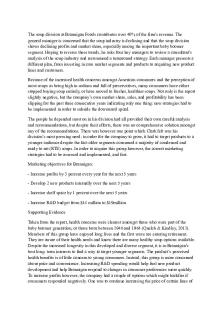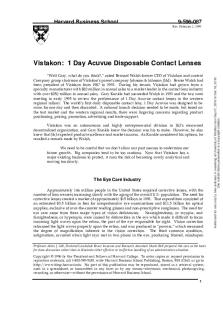Case Analysis for Chipotle Case Study PDF

| Title | Case Analysis for Chipotle Case Study |
|---|---|
| Author | Jillian Alvarez |
| Course | Introduction To Business |
| Institution | Valencia College |
| Pages | 11 |
| File Size | 161.7 KB |
| File Type | |
| Total Downloads | 45 |
| Total Views | 168 |
Summary
Going to have a in depth explanation of the project and how we did it as a team. We recieved an 95% on the case study....
Description
Case Study Analysis : Chipotle Mexican Grill
Kimberly Kort, Jillian Alvarez, Elijah Boynes, John Ruzzano, Genesis Pena, Jacob Bolt Valencia College Introduction to Business 1011 Dr. Charles Bridges III April 25th 2021
Introduction The fast food industry is a dynamic industry full of opportunity but also faces tough challenges. There are specific strategies and systems set in place to tackle these challenges. These systems have been put to good use for many years for several large corporations. The challenges that will be discussed regard pricing, employment, resources and competition. The way to go about this is to conduct a S.W.O.T. analysis, which is a simple but useful framework for analyzing the company’s strengths, weaknesses, opportunities and threats. This paper will cover primarily the marketing and economic aspect as well as a detailed action plan for the case including how to prevent a future similar occurrence.
Challenges Chipotle founded in 1993 by Steven Ells, is fast food in the United States that serves up to $200 billion in sales annually. Chipotle is also known as a “fast-casual” industry that offers all the quality, freshness, of traditional restaurants but fastest and at affordable prices. Today, the company opens a new store every other day and was recently valued at a staggering $21 billion. According to Andres Cardenal Chipotle is “perhaps the most successful growth story in the restaurant industry in recent years.” And according to the restaurant’s website, “food with integrity” is a commitment to the “best very ingredients” and is what it sets apart from its competitors. Up to today, this marketing strategy is being successful, but it can be an issue throughout the year as there are now more fast-food restaurants such as Chick-fil-A and Wendy’s also offering fresh, natural, and non-hormones meals for the same or least price. Other than Chipotle‘s commitment to “food with integrity” back in 2015 the company encountered concerns about its food safety due to farmers violating the pig housing policy that
stated their animals should just eat vegetarian, but also 2,016.55 people were infected with E.coli according to Hollis Johnson report. This had a negative impact on many Americans and even though they were not regular customers or not customers at all they would not want to take the risk of getting food poisoning. As a result, though, Chipotle’s food safety is now better than other fast-food restaurants. Furthermore, customer service at some locations is not the best in comparison to some other fast-food restaurants. Chipotle struggles to keep their employees and one of the reasons is that the minimum wages starting for their employees is too low compared to other fast food restaurants. As a consequence, there are few relationships between customers and employees which is an important part for Chipotle to keep growing as a company.
S.W.O.T. Analysis
Strengths
Weakness
Using Integrity as marketing Power.
Forced to raise prices more than once this decade.
Purchase more naturally raised meats than any other restaurant company.
Relying on minimum wage workers
Marketing.
Limited suppliers of the meat they promise.
Opportunities
Threats
New stores are opening every other day.
Inability to monitor all the places they purchase their meat from consistently.
Viewed as a healthier option. New competitors following similar models. Online orders Old competitors incorporating their model.
Strengths
Chipotle’s strength lies in their use of integrity in their marketing plans. They use the very best ingredients, vegetables grown in healthy soil, pigs that can roam and not factory farmed. The owner toured these factory farms and confinement hog operations and did not want his success or the company’s success to be built on the backs of these poorly treated animals. He believes there is a connection between taste and the treatment of the ingredients. When chipotle first started getting naturally raised hormone and antibiotic free meats were only going to high end restaurants, not these fast food or fast casual restaurants. Today they buy more naturally raised meat than any restaurant. Their marketing campaigns are also a strength. In 2012 they revealed a massive multi tiered marketing campaign focusing on the healthy and ethical choices their food versus other foods makes. They focused on the fact that hundreds of families quit working their family farms in the united states every week due to competition from big agriculture.
Weaknesses One of chipotle’s weaknesses is occasionally being forced to raise prices because of meat going up or other reasons. In 2020 chipotle raised their prices in their app for online orders due to delivery services like uber eats, door-dash, etc. making money from chipotle while chipotle loses money on those orders. Chipotle CFO said they raised their prices 13% in the app (MSN). In 2017 chipotle raised their prices 5% over the entire menu. Their reliance on minimum wage
workers is also a weakness. This may seem like a strength to most businesses and in some respects, it is, but for a global company it can be a hassle. Most of their workers are teenagers and when hiring teenagers, they come with hour restrictions in both hours a day and hours a week they can work. And that differs in every state, and every country. Recently they were cited 1.37 million for 13,253 violations by the Massachusetts Attorney General for child labor law violations. In Massachusetts 16- to 17-year-olds can only work less than 9 hours a day and no more than 48 hours a week, you also need a permit to work. They allowed workers to work longer than 9 hour shifts and more than 48 hours and to work without permits. Another weakness is the farms that supply these meats are so limited that they have limited partners to work with. Limited partners mean prices can go up because they do not have too many people to negotiate with. If there are issues with meats like in 2015 when they temporarily removed pork from 1/3rd of their restaurant’s menus after discovering one of their suppliers violated their pig housing policies. Opportunities The opportunities in Chipotle are plentiful. First and foremost, Chipotle is opening new stores every other day globally. They are a franchised store so you can buy into one. The initial investment to open a Chipotle is 800,00 to 900,000 dollars. They currently have 2,010 stores, tomorrow they will have 2,011. Another opportunity is that they are seen as a healthier option. They have less preservatives in their foods, their meats are hormone and antibiotic free and their vegetables are grown in healthy soil. Another opportunity is their online orders. As mentioned before they increased their prices online 13% to not suffer any losses. However, they made 2.8 billion in online sales which was good for 46% of their sales for the year, fourth quarter online sales rose 177.2%.
Threats One of the threats to Chipotle comes from their inability to monitor all the places their meats come from consistently. Like I previously mentioned they had to stop selling pork at one point due to the way one partner was housing their pigs. For a global company watching over these places becomes more difficult. They have even had to backpedal on a promise they made to use non-gmo ingredients for health and ethical concerns, eventually stating that it's hard to keep this promise because some animals in the U.S are given gmo feed due to its popularity. Steve Kell in Forbes praised the back pedal because it can be viewed as a bet on the younger generations. Another threat are the new companies following this model Bolay, Moe’s, and Five guys. They are using the similar quality ingredients, open kitchen designs so you can see your food being made. Another threat is their old fast-food competitors like McDonalds and Taco bell. Taco bell released its cantina bowl, and McDonalds even released a salad option along with oatmeals.
Marketing All decisions related to Chipotle’s marketing campaign derive from Ells's vision to be a restaurant that serves “food with integrity”. At the time of Chipotle’s founding, Ells identified a gap in the restaurant market. Customers were looking for a healthier alternative to traditional fast food, yet didn’t want to pay the cost of the higher-end full-scale restaurants. So he marketed Chipotle’s ingredients as healthy and natural. Chipotle sources its ingredients from local small
farms and holds those farms to high standards. Vegetables are grown in rich, healthy soil, and livestock is raised naturally and treated humanely. In staying true to its motto, Chipotle has successfully branded itself as a restaurant that is also more than its food. External to restaurant operations, Chipotle strives to educate its customers on the benefits of sustainable farming and the impact of factory farming on the environment, the treatment of animals, and the livelihoods of the family farmer. The marketing for Chipotle was the biggest factor to their rapid growth. The four P's for chipotle is what sets them different from other fast-food chains. For example, The product and price both correlate with each other because it is what everybody is looking for. "Cheap and healthy food". The product for Chipotle is their fresh and organic food. People now want to choose and live a healthier lifestyle but find themselves struggling due to the priciness of organic and fresh food and this is where Chipotle comes into place. They are able to offer the product at a reasonable price, bringing in that group of people. Chipotle is transparent about where they get their meat and vegetables from allowing the customers to feel comfortable and at ease when shopping with them. Chipotle has used a variety of platforms to convey its message. Such methods include the use of social media, a short film, a mobile game, multiple large-scale sustainable food festivals, and the founding of a non-profit: the Chipotle Cultivate Foundation. Chipotle’s campaign of “integrity” continues to rapidly grow its customer base and expand its geographical presence. Economy They see an opportunity in the fact that organic restaurants and grocery stores are on the pricier side and people typically prefer to spend less than that. With that being said Chipotle can see that there is a supply for people wanting to get healthier food at a more affordable price. Chipotle is able to take advantage of this in the sense that no other fast-food chain is able to
supply these groups of people with what they want. This can support rapid growth for the company and attract many customers because they are unique in being one of the only one fastfood chains that can provide this. The marketing for Chipotle was the biggest factor to their rapid growth. The four P's for chipotle is what sets them different from other fast-food chains. For example, The product and price both correlate with each other because it is what everybody is looking for. "Cheap and healthy food". The product for Chipotle is their fresh and organic food. People now want to choose and live a healthier lifestyle but find themselves struggling due to the priciness of organic and fresh food and this is where Chipotle comes into place. They are able to offer the product at a reasonable price, bringing in that group of people. Chipotle is transparent about where they get their meat and vegetables from allowing the customers to feel comfortable and at ease when shopping with them.
Case study questions Chipotle became an example for ethical decision making in the fact-casual restaurant industry. In a market dominated by the drive for profit, Chipotle instead focused and dedicated itself to healthy food, moral and hard-working farmers, and sustainability. In doing so, Chipotle has become an example for ethical decision-making in the fast-casual restaurant industry. Food quality has never been compromised for financial gain or to public image. In 2015, Chipotle discovered one of its suppliers had not been living up to the set standards of animal treatment. In spite of the obvious disruption to service and sequential financial losses, Chipotle stood up to its motto and morals by making a decision few other restaurants would have. It temporarily removed pork from a third of its locations. As a corporate social responsibility, Chipotle has voiced out for lesser use of GMOs, antibiotics, and hormones in farm animals. The growth of the
local farmers has also been encouraged by Chipotle. Both being issues overlooked in the fastcasual food industry in favor of the cheaper ingredients obtained from the farming-factory industry. Chipotle may experience more ethical dilemmas than Taco Bell or McDonald’s in trying to maintain success. In an interview with Fast Company, Ells stated “They [fast food chains] can’t change. The culture is just too ingrained.” Fast-food chains such as Taco Bell and McDonald’s are built on a foundation of convenience, low prices, and large profits with little genuine concern for healthier living for their customer. Instead, they only adhere to trends that will draw in more customers. As the current trend toward healthier food grows, they will come out with healthier options. But when compared to Chipotle, they are more likely to compromise their “healthier options” for profit or confidence. So when a complication arises, Chipotle is left with an ethical dilemma on how to proceed. Compromise their standards and integrity or allow the company to suffer. Chipotle has admitted that they have occasionally been forced to rely on traditionally sourced proteins in order to keep up with demand. In these cases, the decision is not made lightly and Chipotle works to quickly find quality sources to meet their standards and the demand. They also maintain transparency by placing signs in the affected locations to notify their customers of the substitution. As Ells sees it, this lapse in standard is not due to profit, but the belief that the more successful Chipotle is, the more capable the company will be to encourage its suppliers toward more sustainable and integral ingredients. Therefore supporting the mission of “Food with integrity” in the long run. The other restaurants would not have such reservations and would base their decision on profits and convince, just as they’ve always done. When situations arise, establishments such a Taco Bell and McDonald’s will always have the upper hand as they’re not limited by the same sense of integrity that is infused in the Chipotle Brand
and therefore will have more options in dealing with the situation. Conclusion With this being said it can be concluded that after conducting a swot analysis and considering the fact that even though Chipotle is occasionally being forced to raise prices because of meat going up as well as their inability to monitor all the places their meats come from consistently, we see that they are opening another store every other day, they are franchised, and they have a great online presence. Their marketing campaigns are strong as they prioritize making healthy and ethical choices. These factors determine that the organization’s objectives, products, services projects and goals are a strategic fit.
PowerPoint Presentation Link: Case Study Analysis
Sources: Taco Bell, McDonald's Go Upscale To Win Customers Back From Chipotle (forbes.com) AG Healey, Chipotle Reach Nearly $2 Million Settlement to Resolve Child Labor and Earned Sick Time
Violations | Mass.gov Chipotle Raised Prices, But That Didn't Deter Its Fans (therecipe.com)
https://chipotle.com/values https://www.investopedia.com/terms/f/four-ps.asp Company, Fast. “Chipotle: Most Innovative Company.” Fast Company, 1 Jan. 2000, www.fastcompany.com/company/chipotle. Neck, Christopher P., et al. “Chipotle.” SAGE Business, 2016. Crossref, doi:10.4135/9781506379050. Olson, Elizabeth. “Chipotle Ad Promotes Sustainable Farming.” The New York Times, 10 Feb. 2012, www.nytimes.com/2012/02/10/business/media/chipotle-ad-promotes-sustainablefarming.html?_r=0. Safian, Robert. “‘I Didn’t Know What The Fast-Food Rules Were’: Steve Ells.” Fast Company, 16 Oct. 2014, www.fastcompany.com/3036584/i-didnt-know-what-the-fast-food-rules-weresteve-ells....
Similar Free PDFs

Chipotle Case Study
- 13 Pages

Chipotle Case Study
- 6 Pages

Business Case Study Analysis
- 9 Pages

Biopure case study analysis
- 6 Pages

Jetblue Case Study Analysis
- 8 Pages

Microsoft Case Study Analysis
- 12 Pages

IKEA Case Study Analysis
- 7 Pages

Brannigan - Case Study Analysis
- 7 Pages

VolksWagen case study analysis
- 6 Pages

Case Study Analysis
- 13 Pages

Sample Case Study Analysis
- 8 Pages

5100 Case 19 - Case study analysis
- 11 Pages
Popular Institutions
- Tinajero National High School - Annex
- Politeknik Caltex Riau
- Yokohama City University
- SGT University
- University of Al-Qadisiyah
- Divine Word College of Vigan
- Techniek College Rotterdam
- Universidade de Santiago
- Universiti Teknologi MARA Cawangan Johor Kampus Pasir Gudang
- Poltekkes Kemenkes Yogyakarta
- Baguio City National High School
- Colegio san marcos
- preparatoria uno
- Centro de Bachillerato Tecnológico Industrial y de Servicios No. 107
- Dalian Maritime University
- Quang Trung Secondary School
- Colegio Tecnológico en Informática
- Corporación Regional de Educación Superior
- Grupo CEDVA
- Dar Al Uloom University
- Centro de Estudios Preuniversitarios de la Universidad Nacional de Ingeniería
- 上智大学
- Aakash International School, Nuna Majara
- San Felipe Neri Catholic School
- Kang Chiao International School - New Taipei City
- Misamis Occidental National High School
- Institución Educativa Escuela Normal Juan Ladrilleros
- Kolehiyo ng Pantukan
- Batanes State College
- Instituto Continental
- Sekolah Menengah Kejuruan Kesehatan Kaltara (Tarakan)
- Colegio de La Inmaculada Concepcion - Cebu



